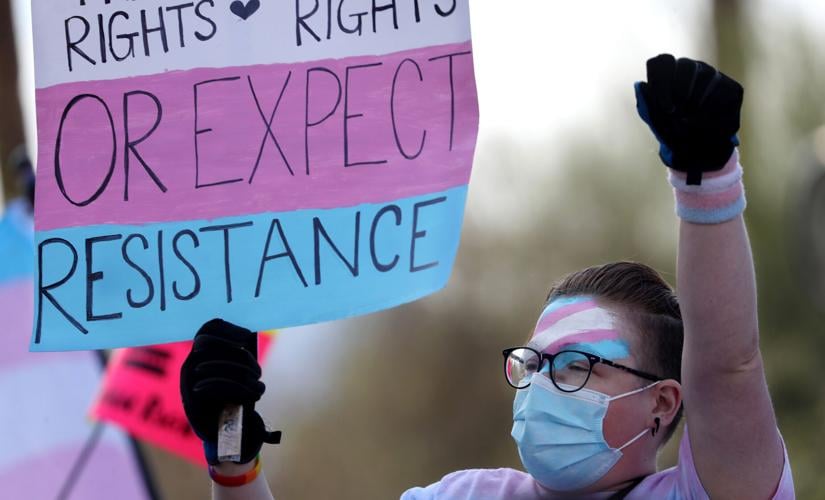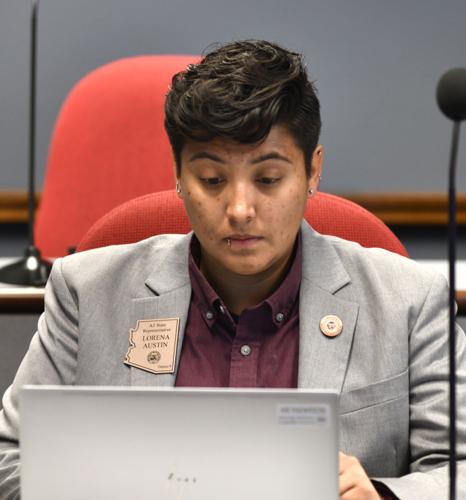PHOENIX — Republican lawmakers advanced legislation to forbid teachers from honoring requests by students to be addressed by a pronoun different from their biological sex unless they have parental consent.
“The child belongs to the parent, not the government,’’ said Rep. Theresa Martinez, R-Casa Grande, in voting for SB1001 Monday in the House Appropriations Committee. “I cannot imagine having to co-parent my child with the government.’’
Rep. Athena Salman, D-Tempe, said that’s fine in situations where children have supportive families.
But she said there are studies showing 70% of transgender children do not have that situation. Salman said “33% of trans and non-binary youth don’t believe and don’t find their current home to be a safe space to do that in, especially for a first time.’’
Sen. John Kavanagh, R-Fountain Hills, sponsor of the legislation, said notifying parents ensures the students get whatever professional help they need, including for depression and suicidal thoughts. Requiring permission to be addressed by a different pronoun is no different than what occurs now in connection with school activities, he said.
“If your kid wants to go on a school trip, they need permission from the parents,’’ Kavanagh told committee members. “If your child wants to be on a sports team, they need permission from the parents. If your child wants to take an aspirin in school, they need permission from the parents.’’
But Kavanagh’s bill does not ensure a parent’s affirmative desire to have a child addressed by a pronoun or a proper name that does not match their gender assigned at birth would be honored by teachers. It says that request can be trumped by a teacher’s “religious or moral convictions.’’
“We’re trying to balance the rights of two parties,’’ he said in an interview with Capitol Media Services. Kavanagh said he presumes that “pretty much everyone else’’ at the school would be honoring the rights of the parents.
“I don’t think it’s a major violation of the parent’s rights,’’ he said.
‘Aims to suppress and intimidate’
“I know what this bill is,’’ said Rep. Lorena Austin, D-Mesa. “This bill is a nationwide agenda that targets and attacks a vulnerable population, and that is our youth,’’ said Austin, who uses “she’’ and “them’’ as her pronouns and identifies “as non-binary, non-gender conforming.’’
“It aims to suppress and intimidate them,’’ Austin said.
To lawmakers who who said that while parents may not understand a child’s request, they won’t kick the child out, Austin said that’s “absolutely, unequivocally false.’’ Austin said youths in the LGBTQ community comprise the largest share of unhoused teens.
Kavanagh sought to portray the measure as one designed to help.
“In youth, especially adolescence, issues around gender are always problematic and cause a great deal of angst,’’ he said. Being transgender, Kavanagh said, only makes that more pronounced.
“The psychological problems that can go along with this can be depression and sometimes suicidal thoughts, especially if they have a condition called gender dysphoria which some have when the conflict is very extreme,’’ he said, referring to the unease someone may have because of a mismatch between biological sex and gender identity.
“These are students who need family support,’’ Kavanagh said. “These are students who need outside psychological care that the family can provide for them.’’
Austin countered that it is bills like this that cause the angst to which Kavanagh refers.
She told of knowing her true identity at age 5.
“I grew up in a community where I knew I would not be accepted, I knew I would not be supported in my home or in public,’’ Austin said. “I need you to hear that,’’ she continued. “This is my lived experience.’’
Other transgender individuals also testified against the measure.
Jeanne Woodbury of Equality Arizona told lawmakers that sometimes a student seeking to come out to parents, even those who may be accepting, may still find it “intimidating.’’
“When you’re a little bit afraid, what’s helpful is to talk to someone like a teacher ahead of time and have that conversation and try things out in a safe space so you can actually prepare yourself to go have the conversation with your parents,’’ Woodbury said.
“What makes the teacher more appropriate to ask or talk to than anyone else?’’ Martinez asked. She said it’s equally possible a teacher might be a “devout Catholic or a devout whatever’’ who does not believe that things like this are a matter of choice.
“It’s not guaranteed that, even going to a teacher, you’re going to find support,’’ Woodbury acknowledged. “But if you face rejection from a teacher, the stakes are lower than if you face rejection from a parent.’’
Rep. Matt Gress, R-Phoenix, said he understands the concerns.
“As a member of the LGBT community, I just can’t imaging having to live a separate life at school and a different life at your home,’’ he said. “And I understand that is the tragic reality that many members of the LBGT community face.’’
But Gress said there’s an overriding issue.
“I just can’t get to the point where I’m willing to allow government employees to have additional information on a child,’’ he said.
“The children belong to the parents,’’ Gress said. “Parents have rights when it comes to their kids. They do. And to sever that relationship through public schools or other institutions, very serious.’’
Gress said he introduced HB2084, which would provide $5 million for a family support program he said would help parents have such conversations with their children. “More dialog is necessary, not less dialog,’’ he said. But the measure never got a hearing after Rep. Beverly Pingerelli, R-Peoria, who chairs the House Education Committee, did not put in on her agenda.
Kavanagh said there are other good reasons to ensure parents know if a child wants to be called by a name or pronoun that does not match his or her biological sex assigned at birth.
One, he said, is that the parent may have the child in treatment and the therapist may counsel that it is psychologically bad to allow the child to to be referred to by a non-matching name or pronoun. Kavanagh said there could be a lawsuit against the school if a child commits suicide and the parent didn’t know the child was being referred to by a different pronoun.
The measure, already approved by the Senate, now goes to the full House.
Get your morning recap of today's local news and read the full stories here: tucne.ws/morning
Photos: Trans Day of Visibility Rally in Tucson

A rally-goer leads a chant standing above a crowd of a couple hundred for the Trans Day of Visibility rally in Presidio Park outside city hall and the Old Pima County Courthouse, Tucson, Ariz., March 31, 2023. The crowd was protesting the recent spate of anti-trans bills making their way through the Arizona legislature.

A rally goer holds a sign with dozens of names of victims of trans hate, one of a couple of hundred protestors at the Trans Day of Visibility rally outside city hall, Tucson, Ariz., March 31, 2023.

Rally organizer Mikey Shock fires up the crowd outside of city hall for the Trans Day of Visibility rally at Presidio Park Tucson, Ariz., March 31, 2023.

Larry Moore, who performs drag under the name Lucinda Holliday, speaks to the crowd of rally goers during open mic time for the Trans Day of Visibility rally outside city hall, Tucson, Ariz., March 31, 2023.

Protestors show their support for trans rights, among a crowd of a couple of hundred who turned out for the Trans Day of Visibility rally outside city hall, Tucson, Ariz., March 31, 2023.

A member of the crowd shows support for a speaker for the Trans Day of Visibility rally outside city hall, Tucson, Ariz., March 31, 2023.

A protestor adds one more flag to her hair as a crowd gathers in Presidio Park for the Trans Day of Visibility rally outside city hall, Tucson, Ariz., March 31, 2023.

A speaker reads a speech using a megaphone to the crowd gathered in Presidio Park for the Trans Day of Visibility rally outside city hall, Tucson, Ariz., March 31, 2023.

Catherine Berge holds her sign over her head as the crowd gathers for the opening of the Trans Day of Visibility rally outside city hall, Tucson, Ariz., March 31, 2023.





